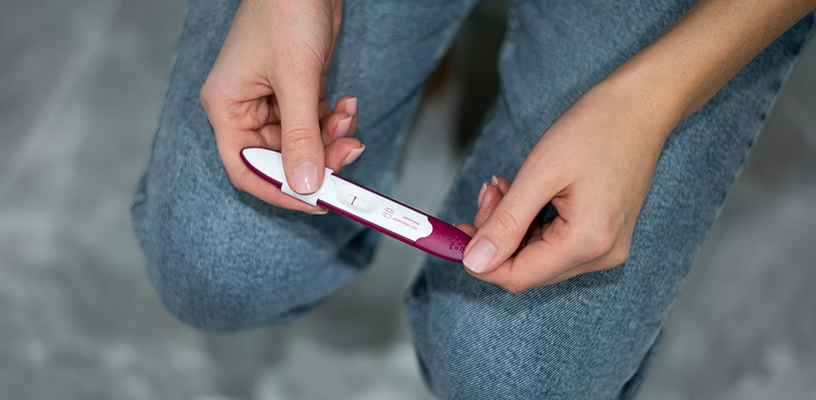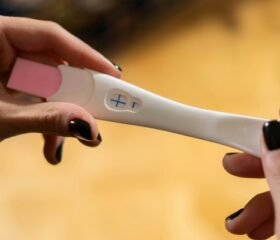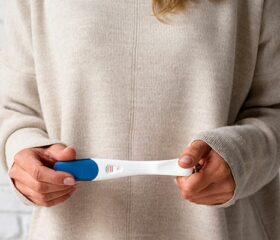Negative Pregnancy Test but No Period: Causes & What to Do
If you missed your period, you may suspect that you’re pregnant—but what does it mean if you take a test, only for it to come back negative?

Although pregnancy tests are generally very accurate, it’s still possible to get a false negative result.
From user errors to underlying medical issues, we’ll break down what can cause false negative results on at-home tests and how to get more accurate results.
Can a negative pregnancy test be wrong?
Yes, although modern pregnancy tests are reliable, it’s still possible to get a negative result when you’re actually pregnant.
A study from Washington University School of Medicine found that about 5% of pregnancy tests return false negative results. 1 Notably, getting one is considerably more likely than getting a false positive, which (while also possible) is exceptionally rare.
What causes false negatives on a pregnancy test?
The number one reason for getting false negative results is testing too early.
Pregnancy tests detect a hormone in your urine called human chorionic gonadotropin (hCG). This is often called the “pregnancy hormone” because your body starts producing it after implantation occurs (when a fertilized egg implants in your uterine lining).
After implantation, your hCG levels begin to rise, nearly doubling every 2 days during your early pregnancy. 2 Although this increase is quick, if you test too early, your levels of hCG may still be too low to show up. 3
Other possible causes of false negatives
While testing too early is the most common reason for false negative results, you can also get them due to:
Other types of user error
Other forms of user error can also lead to false negatives. For instance, if you drink too much water before testing, the hCG in your urine could be too diluted to show up on a test. Most experts recommend testing with your first morning pee, as hCG tends to be more concentrated in it.
You might also get a false negative if you miscalculate the date of your next period or suffer from irregular periods. This could cause you to test too early without realizing. 3
If you’re trying to get pregnant with irregular periods, it’s a good idea to chat with your doctor and monitor your menstrual cycle and fertility more closely by using a period tracker or fertility tracker.
Very high levels of hCG (the “hook effect”)
A phenomenon known as the hook effect can occur if you have hCG levels that are actually too high for a standard home pregnancy test to process. Essentially, the test may get overwhelmed and yield an inaccurate result.
This rare (and seemingly paradoxical) effect is slightly more likely if you’re:
- Further along in your pregnancy than you initially thought
- Carrying multiples (twins, triplets, etc.)
- Suffering from a pregnancy complication, like a molar pregnancy 4
The hook effect tends to be more common with urine tests than blood tests, as the latter are more sensitive and sophisticated.
An egg implanting incorrectly (ectopic pregnancy)
An ectopic pregnancy (where a fertilized egg implants in the wrong place, outside of your uterus) can cause early pregnancy symptoms while showing a negative result on a test.
Ectopic pregnancies aren’t viable and can have fatal consequences for the mother when left untreated. Watch out for the telltale signs of an ectopic pregnancy, such as: 5
- Abdominal, pelvic, or lower back pain (usually on just one side)
- Dizziness or lightheadedness
- Unusual vaginal discharge (brown or red)
If you get a negative result on your pregnancy test and experience any of these symptoms, see your doctor straight away.
Early pregnancy loss
Unfortunately, some pregnancies end in miscarriage not long after conception. This is known as a chemical pregnancy, and they can lead to confusing results on pregnancy tests: either negative results with clear symptoms, or positive results with a total lack of symptoms (followed by your menstrual period not long afterward). 6
This type of pregnancy loss may happen too early for you to have any noticeable signs of a miscarriage, but regardless of what you see on your test, if you had a chemical pregnancy, any pregnancy symptoms you have will subside.
After this type of miscarriage, your hCG levels will drop down to your usual baseline relatively soon (within a few weeks), and it will become clear that you aren’t pregnant after all.
What to do after getting a negative pregnancy test if you have symptoms
If you get a negative result on your pregnancy test but are still certain you’re pregnant, don’t dismiss your intuition. Test again a few days or weeks later when your hCG levels may be higher.
To avoid false negatives or an ambiguous result (i.e., a faint line on your pregnancy test), you should wait until the date of your next expected period to test.
By that point, your hCG levels should be high enough to show up on a pregnancy test strip or digital test. For the most accurate results, you can wait till about a week after your missed period to test. 7
If you want to find out sooner, you can ask your doctor to perform a blood pregnancy test. These are more sensitive than at-home tests. You can find out if you’re pregnant as early as 7–10 days after conception with a blood test. 3
If you have irregular periods, test based on when you had unprotected sex
While a missed period is often the first sign that prompts women to take a pregnancy test, the same doesn’t apply for those who have irregular cycles (since they make it hard to know when your period would have come in the first place). If you’re testing for pregnancy with irregular periods, you’re best off counting 3 weeks after you had sex without using contraception.
Does a missed period always mean you’re pregnant?
If you get a negative pregnancy test result but don’t get your period, it could mean that you’re pregnant. That being said, not all missed periods are the result of pregnancy.
For instance, you could experience changes to your menstrual cycle due to an underlying medical condition, like polycystic ovary syndrome (PCOS). Irregular periods can also be caused by: 8
- Stress
- Excessive exercise
- Rapid weight changes (gaining or losing too much)
- Changes to your routine
- Breastfeeding
- Approaching menopause (i.e., perimenopause)
Even if irregular periods are normal for you, you’re best off getting checked out by your doctor to rule out any underlying medical conditions or lifestyle issues.
Other early signs of pregnancy to watch out for
If you get a negative result without a period but still experience early pregnancy symptoms, it’s a good idea to test again. You can also look out for symptoms such as:
- Breast pain and sensitive nipples
- A heightened sense of smell
- Cravings and food aversions
Again, your intuition is valuable. If you “feel” pregnant, it’s possible you are. With that said, bear in mind that it can be tricky to tell whether you’re experiencing the symptoms of pregnancy or premenstrual syndrome (PMS).
PMS and pregnancy often share symptoms, although there are subtle differences between the two (e.g., breast tenderness shows up much earlier with pregnancy than when it’s the result of PMS). 9
What to know about phantom pregnancies
Another possible reason you could miss your period despite having a negative result on your pregnancy test is due to a condition known as phantom pregnancy. This psychological condition causes you to believe you’re pregnant when you aren’t, and you’ll often experience early pregnancy symptoms as part of it.
Phantom pregnancies can happen whether you’re trying to conceive or avoiding pregnancy. Despite missing your period, you won’t actually be pregnant.
If your doctor diagnoses you with a phantom pregnancy, they’ll first rule out any underlying health conditions that could be causing it before putting you in touch with a mental health professional for treatment.
When to see your doctor about a negative pregnancy test result
If you’re still experiencing early pregnancy symptoms despite a negative test result, or if your period is more than a week late, you should speak to your doctor. Be particularly prompt in speaking with them if:
- You’ve had multiple negative tests taken a week apart, but your period still hasn’t come and you suspect pregnancy.
- You have symptoms of an ectopic pregnancy (severe one-sided pain, dizziness, unusual vaginal bleeding, etc.).
- Your periods are consistently irregular, or you’ve missed more than three cycles in a row (and you seemingly aren’t pregnant).
Your doctor can perform a more sensitive blood pregnancy test, which can detect hCG earlier and at lower levels. They’ll also be able to rule out underlying issues that could be disrupting your menstrual cycle.
Final thoughts
A negative pregnancy test isn’t always as clear as it seems. While false negatives are possible, you can limit your chances of getting one by waiting until the date of your next expected period to test and by following your test’s instructions.
If you’re ever unsure about the results of your pregnancy test, don’t be shy about contacting your doctor.
Article Sources
- WashU Medicine. "Flaw in many home pregnancy tests can return false negative results" Retrieved June 16, 2025.
- Cleveland Clinic. "Human Chorionic Gonadotropin" Retrieved June 16, 2025.
- Cleveland Clinic. "Pregnancy Tests" Retrieved June 16, 2025.
- Gynecologic Oncology Reports. "The “hook effect” causing a negative pregnancy test in a patient with an advanced molar pregnancy" Retrieved June 16, 2025.
- Cleveland Clinic. "Ectopic Pregnancy" Retrieved June 16, 2025.
- Cleveland Clinic. "Chemical Pregnancy" Retrieved June 16, 2025.
- Cleveland Clinic. "Am I Pregnant?" Retrieved June 16, 2025.
- Cleveland Clinic. "Irregular Periods" Retrieved June 16, 2025.
- Medical News Today. "How to tell the difference between PMS and pregnancy symptoms" Retrieved June 16, 2025.







